LONDON: Two years after Russia launched its full-scale invasion of Ukraine, and six months since the Hamas-led attacks that provoked Israel’s assault on Gaza, critics say the responses to these parallel crises are indicative of a double standard at play in the international order.
Following Russia’s invasion of its neighbor on Feb. 24, 2022, the US and European nations were united in their response as they condemned Moscow’s actions as a breach of international law, imposed sanctions, sent weapons and funding to Kyiv, and offered sanctuary to refugees.
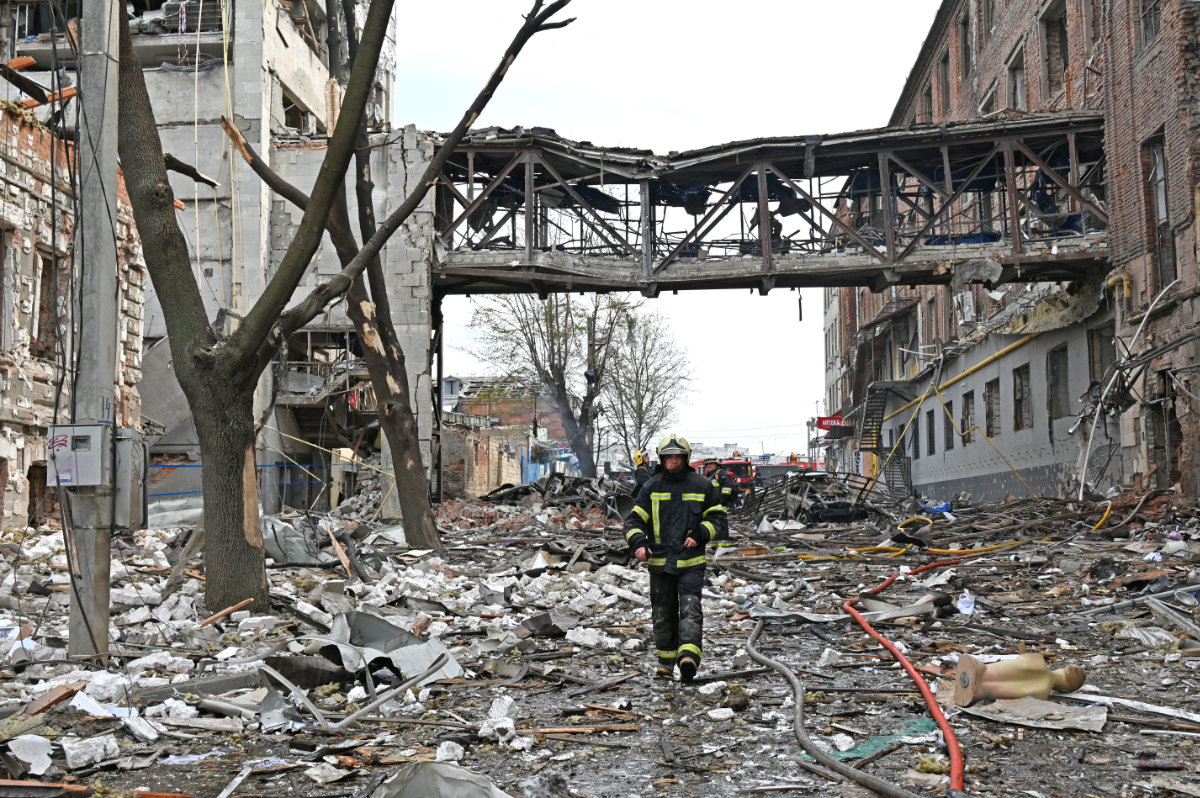
A rescuer walks past buildings destroyed by Russian shelling on the Ukrainian city of Kharkiv on April 16, 2022. (AFP)
After the Oct. 7 attacks last year, in contrast, there was a grim sense of inevitability in the West about what would come next: That Israel would respond ferociously against the Palestinian enclave from which the attack was launched, exacting a heavy toll on civilians in the process.
As the body count rose in Gaza as a result of the Israeli bombardment, one might have expected the international community to respond with a similar chorus of condemnation against the aggressor as it did to the situation in Ukraine, and equivalent expressions of solidarity with the injured party.
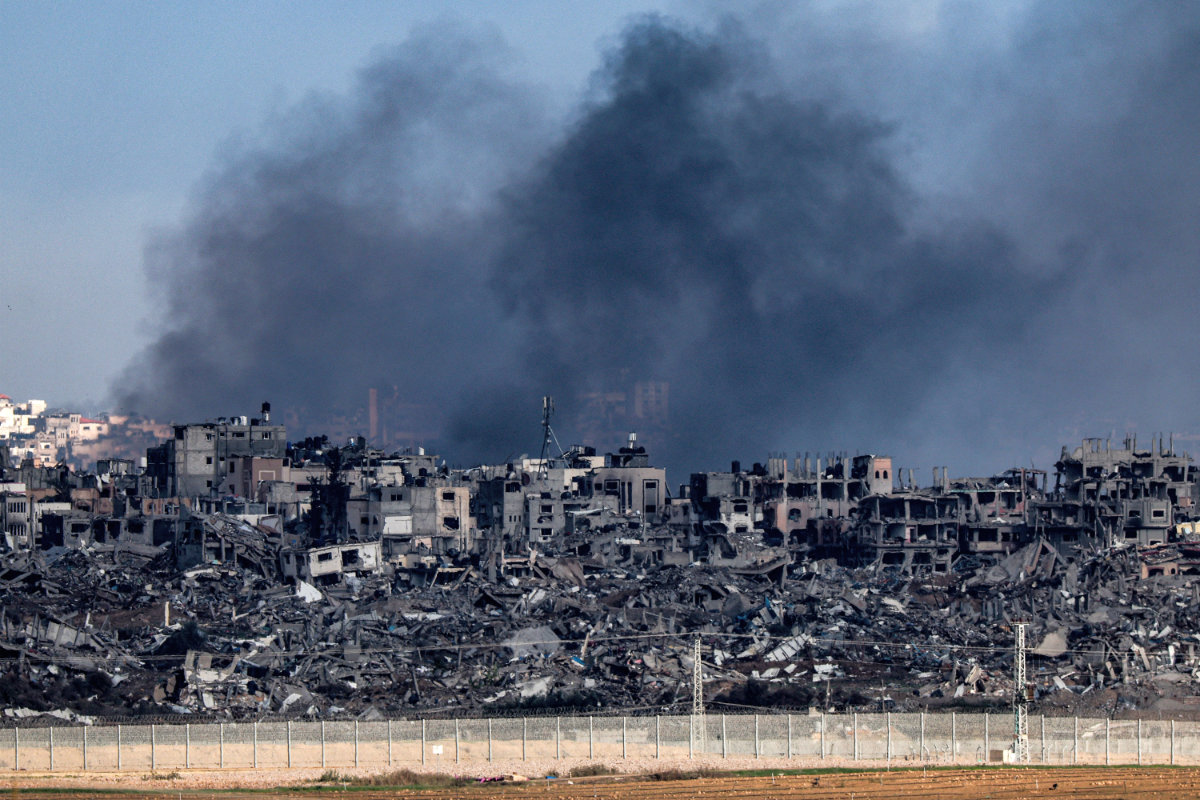
This picture taken on January 3, 2024 shows a view of buildings destroyed by Israeli bombardment in the central Gaza Strip. (AFP)
One might also have expected the similar demands within the UN Security Council for an immediate ceasefire, sanctions and the diplomatic isolation of Israel, along with a generous package of aid for Palestinians.
A glance at the recent foreign aid package approved by the US Senate is perhaps indicative of Washington’s priorities. About $60 billion is to be allocated to Ukraine, $14 billion to Israel and just $10 billion to global humanitarian efforts, including those in Gaza.
IN NUMBERS
• 30k Palestinian civilians killed since Oct. 7, 2023, according to Gaza Health Ministry.
• 31k Ukrainian soldiers killed since Feb. 24, 2022, according to President Zelensky.
• $14bn US aid package to support Israel and military operations in the region.
• $60bn Package allocated to Ukraine.
Sarah Yager, the Washington director at Human Rights Watch, believes the effects of this perceived Western double standard might be felt far beyond the duration of these two crises, eroding whatever faith remains in international humanitarian law.
“Russia’s indiscriminate airstrikes on hospitals and schools have, rightly, drawn condemnation from (US) administration officials,” Yager wrote in Foreign Affairs magazine. “But Israel has carried out attacks striking hospitals and schools without eliciting much protest from the White House.
“Some might argue that the United States can afford a little hypocrisy in order to support its long-time ally, Israel. But playing a part in the erosion of international law will have harmful consequences for the United States far beyond Gaza.
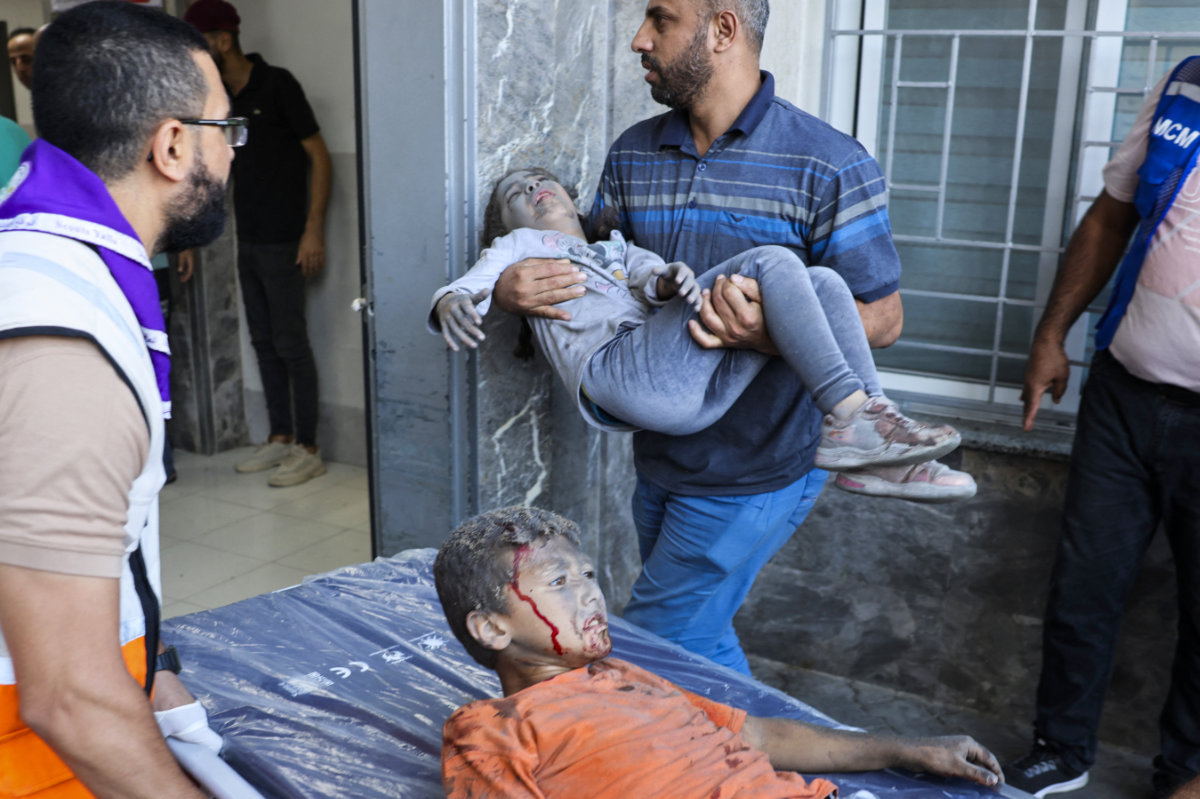
Emergency responders bring wounded children at al-Shifa hospital following Israeli strikes in Gaza City on October 10, 2023. (AFP)
“Future declarations by the State Department concerning atrocities will ring hollow, making it harder to hold perpetrators accountable and deter international crimes. Pressure on warring parties to abide by the law — for example, Azerbaijan or Sudan — will carry less weight.”
Agnes Callamard, the secretary-general of Amnesty International, has similarly condemned the West for the contrast between its support for Ukraine and its relative silence over the Israeli army’s assault on Gaza.
She recently said these differing standards were evident in the “demand that we all rush to the defense of Ukraine, as we should, because Ukraine has been aggressed by Russia and they are unbelievably suffering in Ukraine.
“At the same time (the West) tells us not to act on the bombings and suffering of the people of Gaza. The double standard of those governments is the bigger threat to human rights right now.”
Israel denies accusations that its military deliberately targets health workers and civilian infrastructure. Instead, it has accused Hamas of using tunnel networks beneath Gaza’s hospitals to direct attacks, store weapons and conceal hostages.
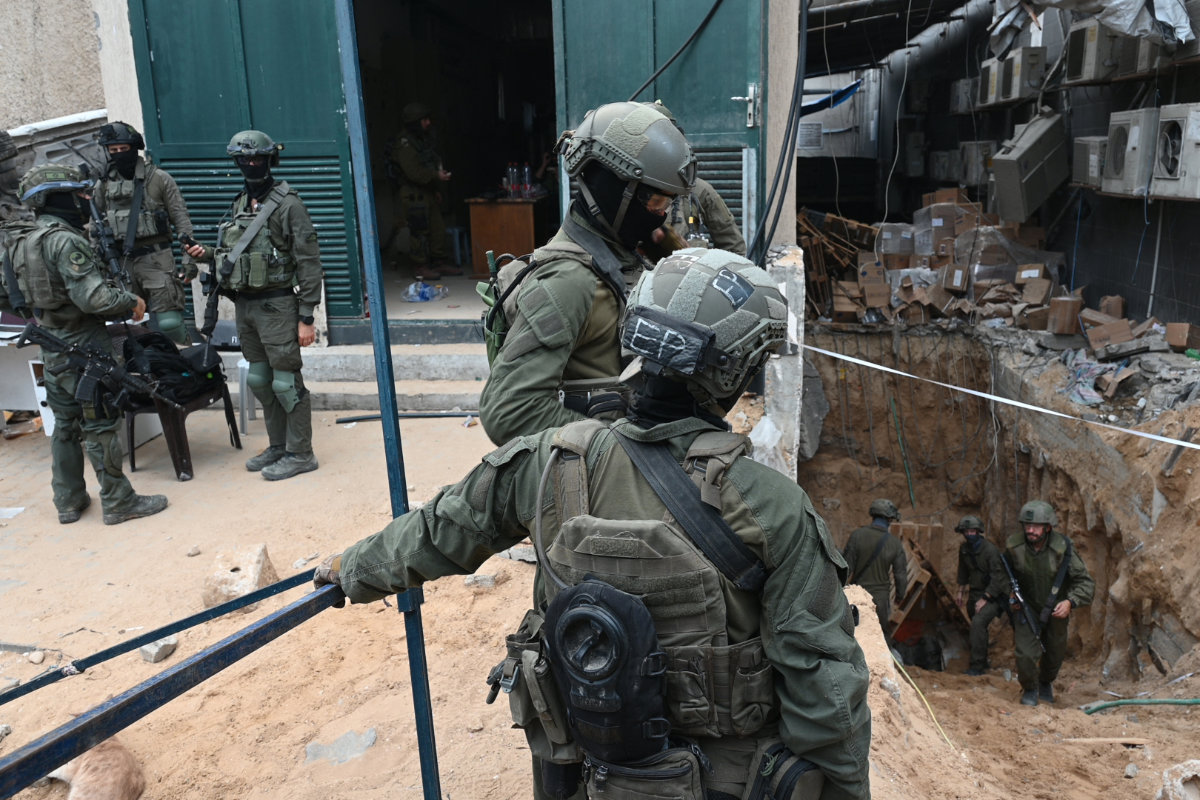
Israeli troops inspect what they said was an entrance to a tunnel dug by Hamas militants inside the Al-Shifa hospital complex in Gaza City in the northern Gaza Strip on November 22, 2023. (AFP)
Any damage to medical facilities, therefore, is the fault of Hamas, Israeli authorities say, accusing the group of using patients and doctors as human shields.
Jamie Shea, an associate fellow with the International Security Program at Chatham House, said it is important to recognize that while the situations in Ukraine and Gaza might appear broadly comparable, viewing the two conflicts as “subsets of the same basic political confrontation” is wrongheaded.
“There will always be some similarities (in wars), such as the terrible impact of war on the civilian populations or the desire of the Western powers to avoid regional escalation,” Shea told Arab News.
“But Ukraine and Gaza are not subsets of the same basic political confrontation in the way that the Ukraine-Georgia conflicts are linked through Russia, or the pro-Iranian militias in the Middle East, like the Houthis, are being mobilized because of Israel’s bombardment of Gaza.”

Another counterargument to the double-standards accusation is that the Israeli-Palestinian conflict lacks the moral clarity of the Russia-Ukraine war.
In comments to the Wall Street Journal in December, British lawmaker Alex Sobel, a Labour co-chair of the UK parliament’s all-party group on Ukraine, said: “There is no moral justification for the Russian invasion. Zero.
“But in Israel and Palestine, it’s about the fact that there are two peoples on a very small amount of land, and political and military elites on both sides are unwilling to settle for what’s on offer.”
Furthermore, as Yager noted in her article for Foreign Affairs, Russia’s invasion of Ukraine was arguably unprovoked, unlike Israel’s retaliation for the cross-border attack by Hamas.
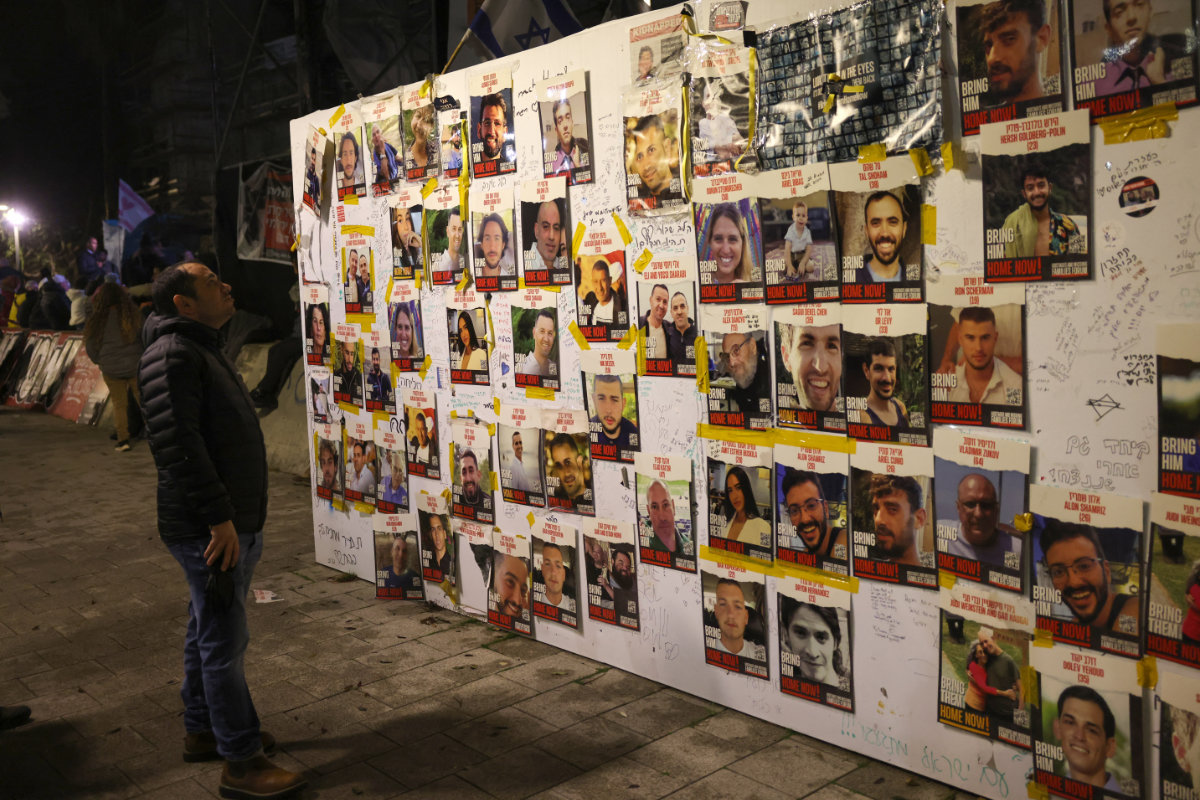
People view the portraits of Israelis taken hostage by Hamas are displayed at a site in Tel Aviv on February 3, 2024. The captives were seized by the Palestinian militants during their surprise attack on Israel on Oct. 7, 2023, provoking an Israeli offensive that has so far killed more than 30,000 Palestinians. (AFP)
Nevertheless, Yager stressed that when “a country decides to use military force, it must fully adhere to the laws that govern conduct in war.”
Eugenie Duss, a research fellow at the Geneva Academy who specializes in the laws of armed conflict, told Arab News that such laws, which apply to state and non-state actors alike, are designed to protect civilians.
Yet it seems that in the view of many Western governments, these rules do not apply to civilians in Gaza. For example, 12 million Ukrainian refugees who fled the Russian offensive have been welcomed by host countries and their rights duly respected.
“I knew a lot of Ukrainians who came (to Britain) about two years ago,” Alla Sirenko, the president and founder of the Ukrainian Cultural Association in the UK, told Arab News.
“They have mostly been women with children and the elderly, and in most cases they have been hard-working people.
“The majority of them have been admired for their resilience, intelligence, hard work and good nature, and (while) most of them are looking forward to returning to Ukraine when it is safe to do so, there has been a lot of goodwill from the British people toward them.”
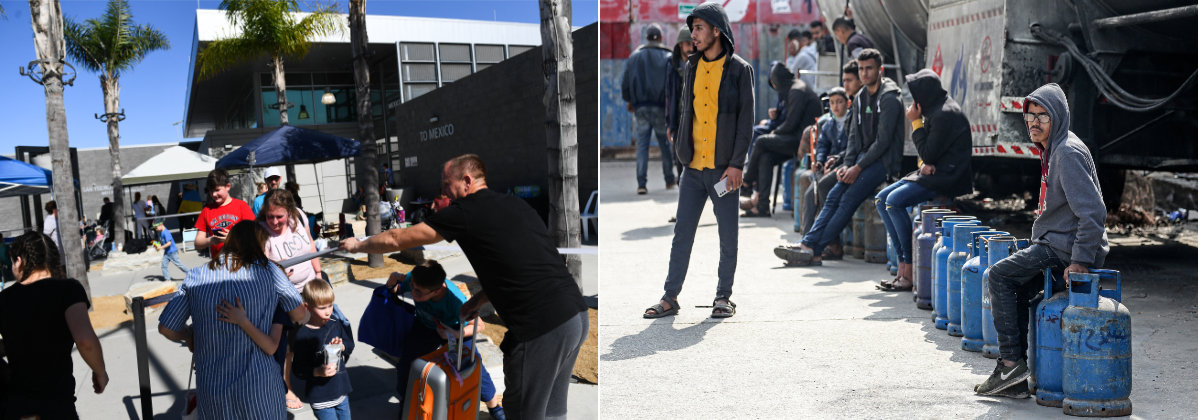
Refugees from Ukraine (left) are welcomed by volunteers in San Ysidro, California on April 8, 2022. Ukrainians fleeing the Russian invasion had been welcomed in Western countries. On the other hand, Palestinian refugees remain stranded at the severely damaged Maghazi camp as they have nowhere to go. (AFP photos)
This welcoming environment was encouraged by the UK government, which offered British citizens financial incentives to offer their spare rooms to house Ukrainian refugees.
Similar schemes generally do not exist in the West for refugees who flee conflicts in the Middle East, including the war in Gaza.
One exception is Canada, which offers a temporary visa-extension scheme for Gazans with relatives who are already resident in the country.
Shea acknowledged the perception of a Western double standard in this, which appears to value the lives of Ukrainians over their counterparts in Palestine. However, he believes the West is trying to inhibit a mass displacement of Palestinians from Gaza because it is concerned about what would happen next.
“In Gaza, the West is trying to prevent a mass exodus of the Palestinian population (including to the West Bank) as this would allow Israel to reoccupy the territory and diminish further the amount of land available to the Palestinians for a viable two-state solution,” he said.
“Once forced to leave, Palestinians are unlikely to be able to return, given the likelihood of more Israeli settlements. And in contrast to the Ukrainians in Europe, they are unlikely to be welcomed by countries like Egypt and Jordan, already experiencing severe economic stress.”

Of course, even the Western support for Ukraine is not limitless. As the war increasingly appears to be mired in a stalemate, politicking in Washington is hampering the allocation of further US aid and, as Western populations grow weary of concurrent crises, goodwill could quickly evaporate.
Colin Alexander, a senior lecturer in political communications at Nottingham Trent University in the UK, said it is “well-trodden ground … that publics become overwhelmed by news of more than one conflict at a time.”
Journalism relies on the “evocation of emotions to create traction” even if the reality is “much more complicated,” he told Arab News, and with multiple victims in multiple conflicts, the attempts to elicit empathy could prove “overwhelming” for some audiences.
“Herein, the world edges toward a difficult scenario, diplomatically as well as militarily,” Alexander said. “The Middle East, Ukraine, North Korea, Taiwan — suddenly there are too many crises to comprehend for even the most avid newsreader.”
So far, however, the Ukrainian Cultural Association’s Sirenko said there is no sign that either a sense of “news fatigue” or any perceived double standards in policies on Gaza has reduced the level of sympathy among the British public for the Ukrainians who have found sanctuary in the UK.
“They don’t feel harassed or diminished because of the war in Palestine,” she said. “We are all sorry about it, but it’s not affecting life for Ukrainians in the UK nor the goodwill of the British people towards them.”





























